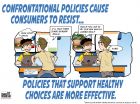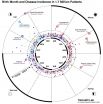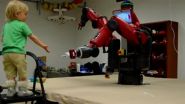Accentuate the positive when it comes to nutrition education
2015-06-08
(Press-News.org) ITHACA, N.Y. - If you want people to choose healthier foods, emphasize the positive, says a new Cornell University study.
Published in the American Journal of Agricultural Economics, the Cornell Food and Brand Lab study showed that when it comes to nutrition education, dos work a lot better than don'ts. This is especially important when determining policies that encourage healthy eating.
Media note: A short video explaining the research, as well as an informational graphic and additional details about this research can be found at, http://foodpsychology.cornell.edu/OP/Hidden_Costs
The researchers - David Just, behavioral economists in the Cornell Food and Brand Lab, and Andrew Hanks, Ohio State University - reviewed existing literature on the consequences of past public policies on nutrition to form suggestions to improve future regulations and found the most successful public policies are those that are framed positively and support choice.
"It's clear that people value freedom of choice," said Just. "When policies seem to encourage good choices, rather than limit bad ones, we see a much more positive response."
In one study, 173 adults who were told to select various meals for lunch reacted differently depending on how the price of each item was proposed. When changes in the price were framed as a tax on unhealthy items, more people chose the unhealthy foods. However, when the change was framed as a price discount for healthy foods, demand for healthy items went up. This shows that rebelling against noxious policies is an important driver of consumer demand and cannot be ignored in policy recommendations.
"Many decisions that we make are not totally rational," said Just. "When trying to impose any sort of change, it is important to try and empathize with our audience and to work with, rather than against, the targets of that policy."
INFORMATION:
[Attachments] See images for this press release:

ELSE PRESS RELEASES FROM THIS DATE:
2015-06-08
This news release is available in French. A new joint study by researchers at the Montreal Neurological Institute and the Centre for the Study of Democratic Citizenship, both at McGill University, has cast some light on the brain mechanisms that support people's voting decisions. Evidence in the study shows that a part of the brain called the lateral orbitofrontal cortex (LOFC) must function properly if voters are to make choices that combine different sources of information about the candidates. The study found that damage to the LOFC leads people to base their vote ...
2015-06-08
A new study gives insight into the mental health of children and teens with Down syndrome and the behavioral medications that medical caregivers sometimes prescribe for them.
The Cincinnati Children's Hospital Medical Center study shows that teens and young adults between the ages of 12 and 21 were significantly more likely to be on psychotropic medications than children 5 to 11 years old. Among children less than 12, the odds of being on a psychotropic medication increased with age for all classes of medications studied. For 12 to 18 year olds, the odds of being on ...
2015-06-08
NEW YORK, NY (June 8, 2015) - Columbia University scientists have developed a computational method to investigate the relationship between birth month and disease risk. The researchers used this algorithm to examine New York City medical databases and found 55 diseases that correlated with the season of birth. Overall, the study indicated people born in May had the lowest disease risk, and those born in October the highest. The study was published in the Journal of American Medical Informatics Association.
"This data could help scientists uncover new disease risk factors," ...
2015-06-08
PROVIDENCE, R.I. [Brown University] -- Researchers from Brown University are developing a new algorithm to help robots better plan their actions in complex environments. It's designed to help robots be more useful in the real world, but it's being developed with the help of a virtual world -- that of the video game Minecraft.
Basic action planning, while easy for humans, is a frontier of robotics. Part of the problem is that robots don't intuitively ignore objects and actions that are irrelevant to the task at hand. For example, if someone asked you to empty the trashcan ...
2015-06-08
Researchers at the University of Illinois at Urbana-Champaign have uncovered physical mechanisms allowing the manipulation of magnetic information with heat. These new phenomena rely on the transport of thermal energy, in contrast to the conventional application of magnetic fields, providing a new, and highly desirable way to manipulate magnetization at the nanoscale.
"In our study, we make use of the fact that a heat current passing through a magnetic material creates a separation of electron spins. This process creates a current of magnetic dipoles that we use to manipulate ...
2015-06-08
DARIEN, IL - A new study suggests that increased restless legs syndrome (RLS) severity is associated with subsequent increased risk of stroke.
Results show that increased RLS severity is associated with subsequent increased risk of stroke, after considering other known risk factors such as age, smoking, hypertension, and unhealthy diet. There were 161 incident stroke cases during the six-year follow-up.
"We were surprised at the importance of taking into account RLS severity -- it was only severe RLS, not milder RLS, that was associated with increased risk of stroke," ...
2015-06-08
DARIEN, IL - A new study suggests that lower life satisfaction is linked to sleep problems during midlife.
Respondents with higher life satisfaction reported shorter sleep onset latency (SOL). Sleep onset delay among those with low life satisfaction could be the result of worry and anxiety, as reported elsewhere. These findings support the idea that life satisfaction is interlinked with many measures of sleep and sleep quality, suggesting that improving one of these variables might result in improving the other.
"These findings support the idea that life satisfaction ...
2015-06-08
URBANA, Ill. - Emerging adults aged 18 to 25 are often criticized for their poor interpersonal skills, sense of entitlement, and casual work ethic. But a new University of Illinois study suggests that fault-finding adult co-workers could make a big difference in young workers' leadership development by developing relationships with them, modeling the behaviors they wish to see, and providing leadership growth opportunities.
"Young adults in our study had learned a lot from mentors who modeled initiative, drive, and persistence; demonstrated how to communicate with confidence ...
2015-06-08
DARIEN, IL - A new study suggests that children with traumatic brain injuries (TBI) have poorer sleep and more daytime sleepiness in comparison to healthy children.
Results show that children with TBI were more likely to experience greater daytime sleepiness, sleep disturbances and a poorer overall sleep quality. The children with TBI also had impaired emotional, physical and social functioning when compared to healthy children.
"We were surprised that children with a TBI experienced persistent increases in daytime sleepiness and decreases in sleep quality compared ...
2015-06-08
A nuclear physicist and an archaeologist at the University of York have joined forces to produce a unique appraisal of the cultural significance of one of the world's most important locations for scientific inquiry.
In a paper published in the journal, Landscapes, Professor David Jenkins, of the Department of Physics at York, and Dr John Schofield, Head of the University's Department of Archaeology, have investigated CERN, the home of the Large Hadron Collider on the Franco-Swiss border.
Situated between the Jura Mountains and the Alps, CERN was established in 1954 to ...
LAST 30 PRESS RELEASES:
[Press-News.org] Accentuate the positive when it comes to nutrition education



